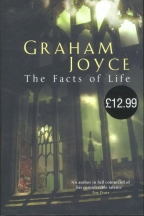The Facts of Life
Graham Joyce
Gollancz
UK Hardback
ISBN: 057507230X
Pages: 288; Price: £12.99
Date Reviewed: 15th January 2003
Reviewed by: Serena Trowbridge © 2003

REFERENCES
COLUMNS
|
|
|
The Facts of LifeGraham JoyceGollanczUK HardbackISBN: 057507230XPages: 288; Price: £12.99Date Reviewed: 15th January 2003Reviewed by: Serena Trowbridge © 2003 |
|
|
REFERENCES |
COLUMNS |
The Facts of Life, according to the Vine family, around whom Joyce's latest novel is centered, are not the facts as we understand them. They are the facts of a different world from ours, a world where a knock on the door can mean a death, and a night of bombing can herald a child. Nonetheless, the facts are all there; it is down to the reader to understand and interpret them. Joyce creates a magical world into which it is impossible not to be drawn.
The novel is based around the lives of the seven Vine sisters, living in Coventry through and after the war with their redoubtable mother, Martha. Many events that take place are seen through the eyes of Frank, the young son of Cassie, Martha's youngest daughter, a beautifully drawn and unusual character. Part of the fascination of the novel lies in the household full of strongly defined women in which the boy grows up; Joyce allows an unusual and utterly effective perspective from the child. The feuds, loves and losses are dealt with strongly and firmly both by the characters and by Joyce himself; this is not a sentimental novel, and all the better for it.
What at first appears to be a dreamy memoir of post-war life in the bombed city quickly turns into a densely packed and carefully woven sequence of events; the gritty realism is embroidered with the threads of magical and supernatural happenings. Nonetheless, not once does Joyce stretch his readers' credulity; everything he writes seems utterly real and a natural part of our world as much as it is his characters'.
The novel is shot through with a sense of unease, hovering in the background like the bombers overhead, though this world through a child's eyes is not frightening but mystical; the young Frank accepts that he can't understand all events and instead examines them with a curiosity and wisdom beyond his years. Joyce does not patronize his readers by explaining every situation, however; he allows us to figure out the omens along with the Vines.
Particularly striking about the novel is Joyce's remarkable prose style, under punctuated, full of familiar cadences and rhythms and authentic dialogue which betrays his Midlands upbringing; particularly as he writes with love about a childhood in Coventry. On his website he says that his upbringing affected his writing in certain ways: "this early training has made me very careful about using fancy language. I prefer a spare prose style". This preference does him credit, and few writers can write both male and female dialogue so convincingly; Joyce does so with a deft touch, and the reflections of the gifted and unusual child add not only to the magic but also to the humor of the narrative. I didn't just read this book, I felt it and dreamed it. Joyce has an unusual talent for creating a world both fantastical and realistic, and the worlds he creates are certainly worth exploring.